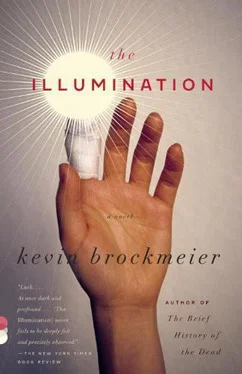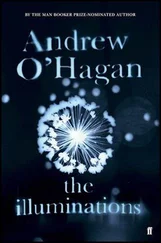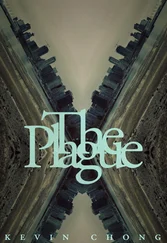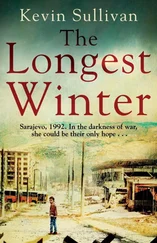The school punished him with two full weeks of suspension. His parents punished him by taking away his stuffed animals. “Plus no Cokes, TV, or comic books,” his mom said. His pretend dad even got her permission to spank him. He gave Chuck ten whacks with a wooden cutting board. Afterward, Chuck noticed him smothering the expression on his face. He looked like he did after he mowed the lawn. He was satisfied with the hard work he had done.
“This was for your own good now,” he told Chuck. “It’s a lesson I can just about guarantee you’ll remember.”
“This family doesn’t even believe in spanking,” his mom added. “You have no idea how disappointed I am in you. I always said I would never hit my child: ever . But this—oh, Chuckie, you broke that poor boy’s arm.”
She was standing at the kitchen counter tapping her feet. The heels of her shoes stabbed the floor like knives.
The days of Chuck’s suspension passed like a long dream. Because both his parents had jobs, he stayed home alone. He imagined he was an orphan without the sad parts. Over and over again, he walked through the empty house. He made little teepees—dominoes—out of his playing cards. He spent a while tossing beanbags at his tic-tac-toe game. (The spotted beanbags were his, the solid ones Todd Rosenthal’s.) He stood at the window looking out over the yard. Cars and trucks and bicycles drifted slowly down the street. Squirrels crossed the grass, their tails jerking on invisible wires. He could see the yellow bricks that lined the porch. As usual, they looked like something he would enjoy tasting. If he was a retard, then he was a retard. He had become too old to do anything about it.
Chuck began visiting Dr. Finkelstein on both Mondays and Thursdays. His mom said she was having concerns about his psychology. (That was a big word for his personality: his psychology.) The doctor kept rubbing his forehead, his three red sunspots. He wondered what Todd Rosenthal could have done to Chuck. Why had Chuck gotten angry enough to break his leg?
Chuck took out a note card and wrote his answer down. Who told you I broke his leg, because I didn’t .
“But why did you push the boy off the tower?”
He did something bad , Chuck began, then crossed it out. He tore something of mine apart and hurt its feelings .
“But only people have feelings,” Dr. Finkelstein said, “not objects.”
This was the most ridiculous thing Chuck had ever heard. Objects were quieter than people, maybe, but no less sensitive. The one big difference was that objects could not move. They weren’t able to fake their feelings or hide them. It was people who could lie, people who could pretend. People could laugh like friends and then beat you up. People could say they were your dad and hit you. Sometimes the faces of people seemed unreal to Chuck, inhuman. They were like masks they wore over their real faces. Masks to show how old or how young they were. Masks to show how healthy or how sick they were. People could cry out of sadness or happiness or anger. But then they could smile for the exact same reasons. The strangeness of people went on and on and on. Objects, on the other hand, were mostly simple and good. Chuck was always kind to them—it was a rule. They needed his help to make it in the world. They had no one else to look out for them. That was why he was so upset about the book. He had tried fixing it and had let it down. It gave off more light now than it had before. Why, then, had he taken it at all, he wondered? He was no more than a thief and a kidnapper. The book would be better off with anyone but him. He might as well give it away to a stranger.
A week into his suspension, someone knocked on the door. Chuck was not supposed to answer it, but he did. A tall man in church clothes stood on the porch. He stooped over the way that grown-ups without kids do. “Why, hello there,” he said, his hands on his knees. “Can you tell me if your parents are at home?”
Chuck shook his head no and began shutting the door.
“Wait,” the man said, and reached into his leather satchel. “Will you give them this flyer when you see them?” He passed Chuck a slip of paper, yellow like butter. The paper read, “For the Lord God will illumine them.” Beneath that was the name and address of a church. And beneath that was a cross surrounded by tiny lines. And beneath that were Chuck’s fingers reaching from his hand. And beneath that was his hand sticking from his sleeve. He was reading the flyer when he had an idea. He held up his palms to say, Wait right here . Then he went to his bedroom and got the diary. He came running back across the living room with it. He turned it over to the man in the suit.
Aloud, the man wondered, “What’s this you have for me?” He looked slightly confused, but fanned through the book’s pages. He tried to return it, smiling encouragingly, his hand outstretched. Chuck backed away, and the man’s smile tightened in confusion. He was about to speak when Chuck shut the door.
The man wasted a few minutes knocking and shouting hello. The doorbell rang nine times, though Chuck imagined a tenth. Finally the noise fell away, and he looked outside again. There was only the empty porch and a fraying spiderweb. The man must have moved on to the next house. Chuck had been worried he would leave the book behind. But, his worries aside, it was no longer there. It wasn’t on the doormat, wasn’t poking from the mailbox. It wasn’t leaning against the stairs or the brick wall. Obviously, he had given up and taken it with him. Chuck hoped that he would give it a loving home.
It was a Thursday, which meant one thing: Dr. Finkelstein. Chuck’s appointment was supposed to last from four to five. His pretend dad had to drive him to the office. “I’m missing two hours’ pay for this crap,” he complained. “That’s two hours of food coming straight from our refrigerator. Two hours of working lights, two hours of running water. Two hours of goddamned gasoline for the goddamned Plymouth Reliant.” He kept honking the horn and shouting “Jerk!” at people.
The doctor was still in another session when they arrived. They lived in the waiting room for a few minutes. Both of them sat down, Chuck and his pretend dad. Chuck skimmed a news magazine he found on the table. Someone, a Chinese soldier, had been shot in the head. Light was gushing from his temple in a sideways fountain. Some children were starving, their stomachs glimmering like crystal balls. Their pain had made them simple, honest, candid, like objects. Chuck had seen it happen many times in his life.
A patient came out, and Dr. Finkelstein called Chuck’s name. He asked Chuck to join him in his office, please. A surprise was waiting on top of the doctor’s desk. He had gotten one of those clacking metal desk toys. It looked exactly like the one Ms. Derryberry had owned.
The doctor set it in motion, and Chuck immediately relaxed. The V-shaped threads rocked back and forth, back and forth. Again and again the silver balls fell tapping into place. The sound filled Chuck with a gentle, swaying, hammocky feeling. “A neat little gadget, this, isn’t it?” Dr. Finkelstein said. He cracked his knuckles and continued. “So let’s get started. On Monday we were talking about your chores at home. Will you write down your least favorite chore for me?”
The only one I really hate is cleaning the tub .
“The tub!” Dr. Finkelstein said, rolling his eyes in exasperation. “Yes, there’s nothing worse than having to clean the tub. Is there anything else you dislike about living at home?”
When my pretend dad yells at me or my mom .
The doctor’s face became animated as he read the note. He was interested, but he tried to pretend he wasn’t. Unless he was only pretending to be pretending he wasn’t. Sometimes people played elaborate games to hide their true feelings. The doctor jotted something down on his pad of paper. “Your pretend dad?” he prompted, reaching for the desk toy. He pinched hold of one of the hanging metal balls. When he let it go, the toy rediscovered its rhythm.
Читать дальше












